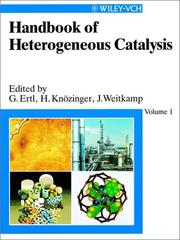| Listing 1 - 3 of 3 |
Sort by
|

ISBN: 3527255621 9783527255627 Year: 1974 Volume: 4 Publisher: Weinheim : Verlag Chemie,
Abstract | Keywords | Export | Availability | Bookmark
 Loading...
Loading...Choose an application
- Reference Manager
- EndNote
- RefWorks (Direct export to RefWorks)
Surface chemistry --- fysicochemie --- Electrons --- Diffraction --- 541.183 --- -Surface chemistry --- Chemistry, Surface --- Interfaces, Chemistry of --- Surface phenomena --- Surfaces (Chemistry) --- Chemistry, Physical and theoretical --- Capillarity --- Surface energy --- Surface tension --- Surfaces (Physics) --- Corpuscular theory of matter --- Atoms --- Leptons (Nuclear physics) --- Matter --- Particles (Nuclear physics) --- Cathode rays --- Ions --- Positrons --- Contact systems. Adsorption. Surface chemistry --- Constitution --- 541.183 Contact systems. Adsorption. Surface chemistry --- Electron diffraction --- Electron beams. --- Adsorption --- Electrons - Diffraction --- Electron emission --- Photoelectron spectra --- Surface (chemistry and physics)
Digital
ISBN: 9783319573779 Year: 2017 Publisher: Cham Springer International Publishing
Abstract | Keywords | Export | Availability | Bookmark
 Loading...
Loading...Choose an application
- Reference Manager
- EndNote
- RefWorks (Direct export to RefWorks)
This book provides an outline of theoretical concepts and their experimental verification in studies of self-organization phenomena in chemical systems, as they emerged in the mid-20th century and have evolved since. Presenting essays on selected topics, it was prepared by authors who have made profound contributions to the field. Traditionally, physical chemistry has been concerned with interactions between atoms and molecules that produce a variety of equilibrium structures - or the 'dead' order - in a stationary state. But biological cells exhibit a different 'living' kind of order, prompting E. Schrödinger to pose his famous question “What is life?” in 1943. Through an unprecedented theoretical and experimental development, it was later revealed that biological self-organization phenomena are in complete agreement with the laws of physics, once they are applied to a special class of thermodynamically open systems and non-equilibrium states. This knowledge has in turn led to the design and synthesis of simple inorganic systems capable of self-organization effects. These artificial 'living organisms' are able to operate on macroscopic to microscopic scales, even down to single-molecule machines. In the future, such research could provide a basis for a technological breakthrough, comparable in its impact with the invention of lasers and semiconductors. Its results can be used to control natural chemical processes, and to design artificial complex chemical processes with various functionalities. The book offers an extensive discussion of the history of research on complex chemical systems and its future prospects. Gerhard Ertl received the Nobel Prize in Chemistry in 2007 for his studies on heterogeneous catalysis and self-organization processes in surface chemical reactions. He was the director of the Physical Chemistry department at the Fritz Haber Institute of the Max Planck Society in Berlin, where he is currently a Professor Emeritus. Prof. Alexander S. Mikhailov, of the same institute, is a theoretical physicist who has been working with G. Ertl for more than twenty years. He is the author of three monographs published by Springer and was awarded the International Solvay Chair in Chemistry in 2009. Together, the authors initiated and organized a series of international conferences on "Engineering of Chemical Complexity".
Classical mechanics. Field theory --- Statistical physics --- Solid state physics --- Physics --- Surface chemistry --- Physicochemistry --- Organic reaction mechanisms and kinetics --- Biology --- Applied physical engineering --- Biotechnology --- Computer science --- thermodynamica --- chaos --- oppervlakte-onderzoek --- toegepaste wiskunde --- theoretische fysica --- biologie --- informatica --- biotechnologie --- ingenieurswetenschappen --- fysica --- moleculaire biologie --- kogellagers --- fysicochemie --- dynamica

ISBN: 3527292128 9783527292127 Year: 1997 Publisher: Weinheim : Wiley-VCH,
Abstract | Keywords | Export | Availability | Bookmark
 Loading...
Loading...Choose an application
- Reference Manager
- EndNote
- RefWorks (Direct export to RefWorks)
The first comprehensive survey of the principles and applications of heterogeneous catalysis!Starting with the invention of Dobereiner's tinder box and reaching importance with Haber's development of ammonia synthesis, heterogeneous catalysis has become a multi-billion dollar business. Simultaneously, literature on heterogeneous catalysis has become increasingly widespread and difficult to follow.This handbook collects the available knowledge on heterogeneous catalysis and provides the reader with easy-to-find yet comprehensive information. With contributions from more than 200 leading experts from all over the world it covers all aspects of the subject, from physico-chemical foundations to large-scale industrial applications.With its highly topical contributions, the straightforward presentation of the material and its comprehensive coverage, this handbook sets new standards. Saving you the time for laborious searches for information, it is an indispensable tool for every scientist working in heterogeneous catalysis.
| Listing 1 - 3 of 3 |
Sort by
|

 Search
Search Feedback
Feedback About
About Help
Help News
News